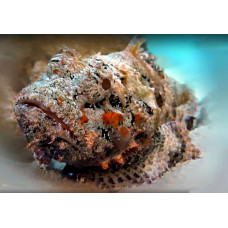Latin name
Synanceia verrucosa
Other names
Reef stonefish
Identification
The head is broad and flat. The skin is tough and rough, with warts. The small upward facing eyes have a deep pit behind them and a smaller pit underneath. The dorsal spines of this fish are of equal length with a thicker sheath of skin containing venom glands at the base. There are no scales on the skin, but there are numerous warts.
Features of fish fins
The dorsal fin has 12 to 14 spines and 5 to 7 soft rays, while the anal fin has 3 spines and 5 or 6 soft rays. The flippers are fleshy.
Fish colouring
Usually brown or grey, may have areas of yellow, orange or red.
Distribution
They inhabit the shallow tropical marine waters of the western Pacific and Indian Oceans, extending from the Red Sea and the coast of East Africa to French Polynesia, southern Japan and the vicinity of Taiwan.
Habitat
This fish lives on coral reefs. It can be found on and around rocks and plants or resting on the seabed.
Size
The maximum recorded total length of this species is 40 cm (16 inches), but a length of 27 cm (11 inches) is more typical. The maximum published weight is 2.4 kg.
Behavior
These fish have developed many adaptations to help them thrive on the bottom of reefs. The texture and colour of their skin is very heterogeneous, which helps them to hide and camouflage themselves between rocks and coral. The 13 dorsal spines and accompanying venom sacs are another adaptation that protects the animal when necessary.
Food and feeding habits
They feed mainly on small fish, shrimps and other crustaceans. They catch their prey by sitting motionless on the bottom of the reef and waiting for animals to swim by. The fish then devour their prey with incredible speed.
Reproduction
It is a solitary animal for most of its life, only briefly associating with members of the opposite sex during the mating season. When the female reaches sexual maturity, she lays unfertilised eggs on the bottom of the reef. The male then swims by and releases sperm onto the layer of eggs, fertilising them. The eggs are quite large and produce well-developed juveniles. The female does not discriminate between males, who may deposit their sperm on the egg layer. Sexual dimorphism is evident in these fish, with females being larger than males.
Life expectancy is around 10 years, but this can vary depending on factors such as habitat conditions and predation.
Fishing
The main commercial importance of this fish is as an aquarium pet. It is also sold as meat in Hong Kong markets. It is consumed in the Philippines, particularly in Chinese restaurants, and in Japan.
Relationship with a person
It is the deadliest fish in the sea, possessing a highly effective venom that can be fatal to humans. There is a serum that is effective if applied immediately after being needle.
| Classification | |
| Phylum | Chordata |
| Class | Actinopterygii |
| Squad | Scorpaeniformes |
| Family | Scorpaenidae |
| Genus | Synanceia |
| Species | S. verrucosa |
| Features | |
| Conservation status | Least Concern |
| Habitat | Bottom |
| Life span, years | 10 |
| Maximum body weight, kg | 2,4 |
| Maximum length, cm | 40 |
| Sailing speed, m/s | No information |
| Threat to people | Not edible |
| Way of eating | Predator |
Stonefish
Tags: stonefish



